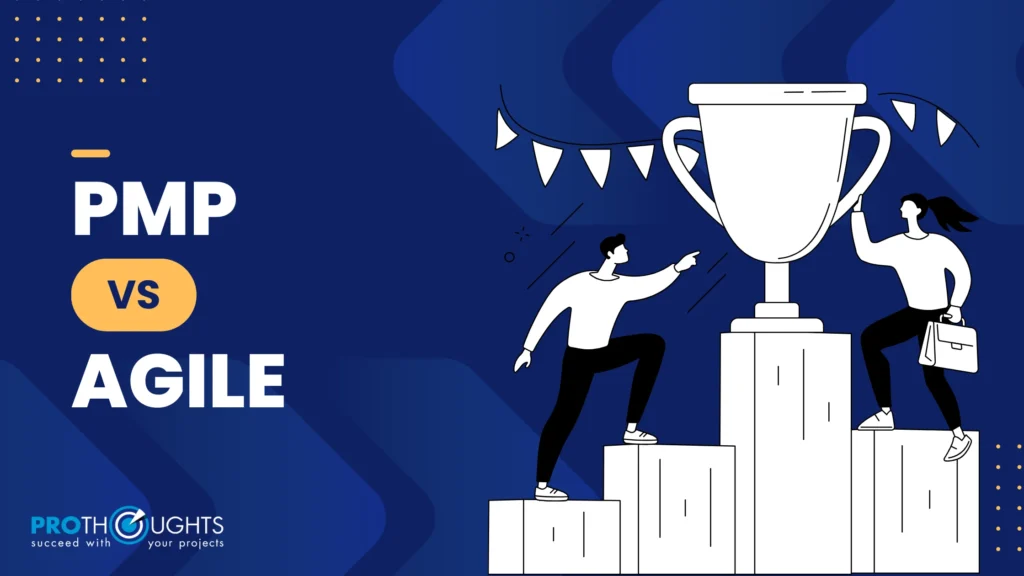PMP, Disciplined Agile
At present, PMP and Disciplined Agile are viewed as the foremost and most crucial certifications provided by PMI by numerous individuals. PMI carefully studies differences in the current, future, and long-term future to develop standards and certifications that tackle those differences. The 7th edition of PMBOK was meticulously planned in advance, and the addition of Disciplined Agile in 2019 was included in a strategic initiative to enhance organizational agility. Let’s further investigate the contrast between PMP and Agile, as PMI has strategically decided to bring in PMBOK 7 and DA.
PMP vs Disciplined Agile: What’s The Difference?
- Conceptual Difference
PMP is structured as a framework, whereas Disciplined Agile is designed as a toolkit. According to the Cambridge Dictionary, a Framework is a set of rules, concepts, or principles utilized to strategize or make decisions. On the other hand, it acts as a framework on which something can be constructed. Therefore, obtaining a PMP certification provides you with the necessary framework to establish your own business.
It provides you with principles and guidelines for customizing how you oversee your projects.
In contrast, Disciplined Agile is a set of tools. Hence, it provides a variety of tools or choices, based on your specific context and circumstances. Employing Agile, Lean, and various Agile techniques, Disciplined aids in enhancing the efficiency of both you and your teams. In addition, it covers the PMP and principles found in the PMBOK guide. If you prioritize agility (with added project management measures), opt for Disciplined Agile in the PMP vs Agile debate.
- Aim Behind The Courses
PMP is created for project managers to oversee their projects and obtain optimal results. The new version discusses Project Outcomes, which is quite perplexing and should be applied in relation to Benefits and Program Management. Contrarily, Projects focus on Project Output that pertains to Deliverables and the capability to deliver. Therefore, the phrase “Project Output” appears to be a better fit.
Disciplined Agile is created for teams and companies to attain Business Agility. Business Agility occurs when the whole company shifts its focus towards creating value for the customer and is not limited to just one team. If every function and team is not agile, the business will not be agile. In this way, DA assists in achieving genuine organizational agility by creating a systematic approach to working. The process begins with a team embracing Disciplined Agile, and gradually, the organization incorporates a better way of operating.
- Application Of Both Certifications
We would describe PMP’s positioning as universal – suitable for all projects in various fields and locations. This is because it originates from the Project Management Standard, which is not dictatorial and suited to every project.
However, Disciplined Agile offers complexity and innovation within the realm of Agile methodologies. It focuses on Agile practices, and we think it pairs well with PMP. An individual seeking to delve deeper into Agility and specialize can thoroughly investigate Disciplined Agile. Similarly, if they aim to effectively oversee their project, PMP can be the solution.
Nevertheless, the mindset is crucial for DA. Many teams and organizations have implemented Agile practices, yet continue to follow a Waterfall approach when managing projects. The mindset does not completely shift to Agile. In Disciplined Agile, the mindset serves as a fundamental “View” or building block. The attitude must be flexible, and grounded in the established principles and guidelines of Disciplined Agile. It is only after this that the implementation of Disciplined Agile becomes possible.
- Course Curriculums
Both of these certifications, PMP and Disciplined Agile, require a strong focus on knowledge. Therefore, with competent direction, attendees feel happy at the conclusion of their instructional sessions. Feedback provided by our previous customers could offer insights. The quality of the material for PMP and Disciplined Agile is excellent. There is ample knowledge to acquire, forget, and most importantly, put into practice in practical scenarios.
For instance, PMP will concentrate on different techniques and frameworks, such as Process Groups (formerly known as) and Performance Domains (the Knowledge Areas), and provide customization recommendations for your project. Additionally, various models, such as Agile and Hybrid project management models, are included in the guidance, along with foundational knowledge.
Disciplined Agile offers extensive coverage and is a remarkable blend of Lean, Agile, Scrum, among other methodologies. It includes a wide range of crucial information on various Agile methods, offering strategies and guidance for not only your IT project team but also for all departments within the company. Thus, you are able to provide significant value in the most efficient manner.
- End Goal Of The Courses
The main idea of obtaining a PMP certification is to understand how to successfully complete projects under limitations and satisfy customers’ needs.
The main point of Disciplined Agile is to embark on a path of Agile Adoption and Transformation to help your team and organization create value in a highly efficient and effective manner.
- Who Is It For?
The PMP certification is designed for Project leaders, practitioners, and experts in various industries and locations.
The certifications offered by Disciplined Agile are for a wide range of individuals, including all those who contribute to providing value to the customer. Generally, “frameworks” are suitable for project teams and units responsible for delivering value. However, DA goes further by implementing Agility across all areas of a company. Whether they are part of project teams, Operations, Support, Marketing, Sales, Procurement, Legal, Finance, etc., anyone who helps deliver value to the customer will benefit from Disciplined Agile!
- Market Prestige
Obtaining the PMP Certification boosts your reputation with employers in various industries and locations. It is a top certification and a requirement for managing your projects. Indeed, in certain companies, having a project management credential is a requirement to oversee a project. Thus, PMP certification can play a key role in securing a job and advancing your career.
Disciplined Agile is a unique and innovative addition to Agile Market. PMI’s endorsement lends enough credibility for it to be accepted by key industry figures. It contains valuable information, and numerous prominent leaders and organizations have begun implementing Disciplined Agile. By 2024, big names such as Franklin Templeton and Barclays have implemented DA and seen impressive outcomes. We are confident that the demand for Disciplined Agile will grow significantly in the near future, causing its value to rise.
Conclusion
We hope to have covered everything you had to know about the differences between PMP and Disciplined Agile certifications. None is better or worse than the other, but it’s just a matter of preference and current work environment. You can enroll in the course of your choice now that all the minute details are up on the table for you! So, which one are you picking?







